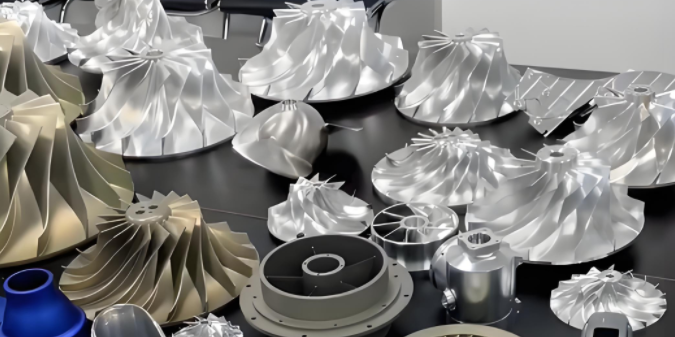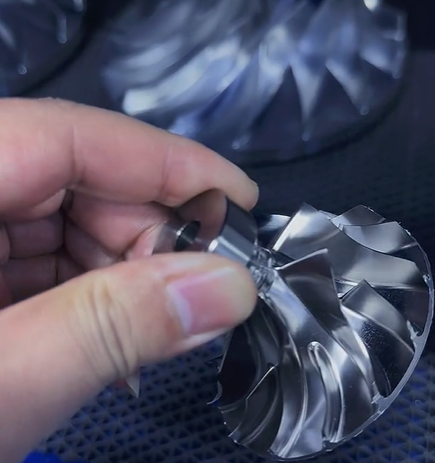Impellers are vital components in turbomachinery, such as pumps, compressors, and turbines, where material selection impacts performance, durability, and cost. This guide provides a comprehensive overview of key materials for impeller machining, including aluminum alloys, nickel alloys, stainless steel, bronze, titanium, and polymers, detailing their properties, applications, and manufacturing considerations for optimal performance.
Key Factors in Impeller Material Selection
Material selection for impeller machining requires balancing multiple factors to meet performance and economic goals. These include operating conditions (temperature, pressure, fluid corrosiveness), mechanical properties (strength, hardness, fatigue resistance), corrosion and wear resistance, compatibility with manufacturing processes like CNC 가공 or additive manufacturing, and economic considerations such as cost and recyclability.

Common Materials for Impeller Machining
Impellers are machined from a range of materials, each suited to specific applications based on their mechanical and environmental properties. Below is a detailed breakdown of the most commonly used materials.
| 재료 | 주요 속성 | 애플리케이션 | 장점 | 제한 사항 |
|---|---|---|---|---|
| Aluminum Alloys (e.g., 6061, 7075) | Lightweight, good corrosion resistance, yield strength: ~250-550 MPa | Low-pressure pumps, aerospace, automotive | Cost-effective, easy to machine, lightweight | Lower strength than steel, less resistant to abrasive fluids |
| Nickel Alloys (e.g., Inconel 625, Hastelloy) | High corrosion resistance, strength at high temperatures (~600-800 MPa yield) | Chemical processing, high-temperature turbines | Excellent for extreme environments, durable | High cost, challenging to machine |
| Stainless Steel (e.g., 316, CA6NM) | High corrosion resistance, strength, hardness (Yield strength: ~200-500 MPa) | Water pumps, chemical processing, marine | Excellent corrosion resistance, durable at high RPMs | Higher cost, heavier than polymers |
| Bronze (e.g., BS 1400 LG2, Gunmetal) | Corrosion resistance, good machinability, hardness (~120-150 HB) | Water pumps with low sand content, saltwater | Cost-effective, rust-free, good surface finish | Softer, less wear-resistant for abrasive fluids |
| Titanium Alloy (e.g., Ti-6Al-4V) | High strength-to-weight ratio, corrosion resistance (~900 MPa yield) | Aerospace, high-performance pumps | Lightweight, excellent corrosion resistance | 비싸고 기계 가공이 어려운 제품 |
| Polymers (e.g., PPS, PEEK-GF30) | Lightweight, corrosion-resistant, suitable for 80-100°C | Low-pressure pumps, medical, micro-turbines | Cost-effective, recyclable, lightweight | Limited to lower temperatures and stresses |
알루미늄 합금
알루미늄 합금, such as 6061 and 7075, are lightweight (density ~2.7 g/cm³) and offer good corrosion resistance with yield strengths of 250-550 MPa. They are easily machinable, making them ideal for low-pressure pumps in aerospace and automotive applications. For example, 7075 aluminum is used in impellers requiring high strength-to-weight ratios. However, their lower strength compared to steel and reduced resistance to abrasive fluids limit their use in harsh environments.
니켈 합금
Nickel alloys, such as Inconel 625 and Hastelloy, provide exceptional corrosion resistance and high strength at elevated temperatures (yield strength ~600-800 MPa). They are suited for chemical processing and high-temperature turbine applications, handling aggressive fluids like acids or saltwater. Inconel 625, for instance, maintains integrity at temperatures up to 980°C. Their high cost and machining difficulty, requiring specialized tools like carbide cutters, are notable drawbacks.
스테인리스 스틸
Stainless steel grades like 316 and CA6NM offer high corrosion resistance and strength (yield strength ~200-500 MPa), making them ideal for water pumps, chemical processing, and marine environments. For example, 316 stainless steel is used in deep well pumps operating at 3600 rpm due to its resistance to sand abrasion. Its higher cost and weight compared to polymers are limitations in less demanding applications.
브론즈
Bronze, such as BS 1400 LG2 or gunmetal, is cost-effective for clean water pumps with low sand content, offering corrosion resistance and good machinability (hardness ~120-150 HB). Its rust-free properties ensure a smooth surface finish, enhancing pump efficiency. However, its softer nature makes it less suitable for abrasive fluids.
티타늄 합금
티타늄 합금 like Ti-6Al-4V provide a high strength-to-weight ratio (yield strength ~900 MPa) and excellent corrosion resistance, making them ideal for aerospace and high-performance pump applications. Their lightweight nature (density ~4.43 g/cm³) is a key advantage, but high cost and machining challenges limit their use to specialized applications.
Polymers and Polymer Composites
Polymers like PPS and PEEK-GF30 are lightweight and corrosion-resistant, suitable for temperatures of 80-100°C. Glass-reinforced PPS, for example, withstands radial and tangential stresses of 100 and 83.5 MPa at 4500 rpm, making it viable for low-pressure pumps, medical devices, and micro-turbines. Their cost-effectiveness and recyclability are advantages, but they are limited to lower-stress and lower-temperature applications.

Manufacturing Processes for Impeller Machining
The manufacturing process must align with the material to achieve precision and efficiency. Common methods include CNC machining, casting, additive manufacturing, and powder metallurgy.
| 프로세스 | Suitable Materials | 정밀도 | 애플리케이션 | 장점 | 제한 사항 |
|---|---|---|---|---|---|
| CNC 가공 | Aluminum, Nickel Alloys, Stainless Steel, Titanium | ±0.05 mm | Aerospace, small to medium production | High precision, repeatable | Material waste, high cost for complex geometries |
| Casting | Bronze, Aluminum, Stainless Steel | ±0.1-0.2 mm | Large impellers, high-volume production | Cost-effective for large runs | Potential for casting defects |
| 적층 제조 | Polymers, Nickel Alloys, Titanium | ±0.1 mm | Prototyping, complex geometries | Design flexibility, reduced lead time | Surface roughness, post-processing required |
| Powder Metallurgy | Nickel Alloys, Titanium | ±0.05-0.1 mm | High-strength impellers | Complex shapes, high strength | High cost, limited material options |
CNC 가공
CNC machining, particularly five-axis systems, achieves profile accuracies of ±0.05 mm and surface roughness of Ra 0.8–1.6 µm, making it suitable for aluminum, nickel alloys, stainless steel, and titanium. It is ideal for small to medium production runs but generates material waste, increasing costs for complex geometries.
Casting
Casting is cost-effective for high-volume production of bronze, aluminum, or stainless steel impellers, with tolerances of ±0.1-0.2 mm. It is prone to defects like core shifts, which can affect impeller balance, making it less suitable for high-precision applications.
적층 제조
Additive manufacturing, such as selective laser melting for nickel alloys or FDM for polymers, enables complex geometries with lead times as low as 14 hours. It is ideal for prototyping but requires post-processing to achieve desired surface quality (±0.1 mm precision).
Powder Metallurgy
Powder metallurgy is used for nickel alloys and titanium, offering high strength and precision (±0.05-0.1 mm). It is costly and limited by material availability but excels in producing complex, high-strength impellers.
Application-Specific Material Recommendations
Aluminum alloys are ideal for lightweight, low-pressure pumps in automotive or aerospace applications. Nickel alloys suit high-temperature or corrosive environments, such as chemical processing. Stainless steel and bronze are reliable for water pumps, titanium for high-performance aerospace impellers, and polymers for low-stress, corrosion-resistant applications. Recyclability favors aluminum and polymers.
결론
Selecting the optimal material for impeller machining involves evaluating operating conditions, mechanical demands, and manufacturing constraints. Aluminum alloys offer lightweight, cost-effective solutions, while nickel alloys excel in extreme environments. Stainless steel, bronze, titanium, and polymers provide tailored options for specific applications. Aligning the material with processes like CNC machining or additive manufacturing ensures precision, efficiency, and durability.
